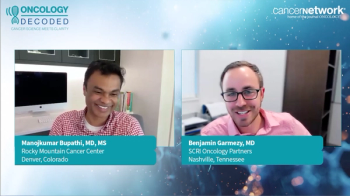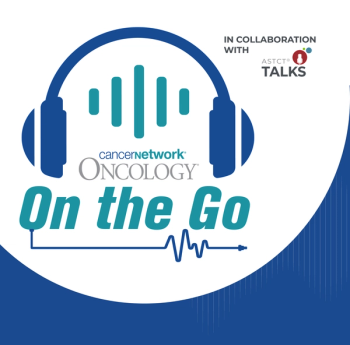
Experts discuss new modalities such as HPV vaccines, balancing hope with realism, and other considerations in cervical cancer management.

Your AI-Trained Oncology Knowledge Connection!


Experts discuss new modalities such as HPV vaccines, balancing hope with realism, and other considerations in cervical cancer management.

Nathan Goodyear, MD, discussed key insights in integrative oncology care as well as evidence-based, patient-centric tools that may optimize QOL outcomes.

Experts cover the regulatory approvals and clinical trial readouts from 2025 that may move the needle for prostate cancer management.

Host Brandon Mancini, MD, MBA, FACRO, introduces a special podcast series focused on delivering key insights and takeaways in the radiation oncology space.

Opening dialogue and establishing connections across different oncology camps may enhance the use of integrative modalities and bolster patient outcomes.

Experts break down the clinical trial data and regulatory developments that made 2025 a “remarkable year” in kidney and bladder cancer management.

Jose G. Trevino II, MD, FACS, emphasized educating patients and physicians alike to help recognize early signs of pancreatic ductal adenocarcinoma.

Experts share updated results on investigational hematologic oncology regimens that they presented at the 2025 ASH Meeting.

Experts highlight considerations for treating patients with oligometastatic kidney cancer, such as differentiating between de novo and recurrent disease.

Experts from Georgia Cancer Center highlight ongoing retrospective studies, translational research, and other initiatives across different cancers.

Michael Barish, PhD, discusses a novel cellular therapy for patients with glioblastoma that harnesses chlorotoxin, a peptide found in scorpion venom.

Experts discussed supportive care and why it should be integrated into standard oncology care.

Experts highlight the top 5 presentations from ESMO 2025 that may have long-term clinical implications for genitourinary cancer management.

Presenting investigators at ESMO Congress 2025 highlight findings from clinical trials assessing novel therapeutics across different disease types.

“Paradigm-changing events” are occurring across the small cell lung cancer field in real time, according to Anne Chiang, MD, PhD.

Hosts Manojkumar Bupathi, MD, MS, and Benjamin Garmezy, MD, discuss presentations at ESMO 2025 that may impact bladder, kidney, and prostate cancer care.

Experts highlight anticipated sessions at the 2025 ESMO Congress, including those on the PSMAddition and EV-303 trials.

Jorge Cortes, MD, outlines the impact of imatinib in chronic myeloid leukemia and highlights future initiatives in the field.

A panel of oncology pharmacists discusses the role of lifileucel in metastatic melanoma and other considerations for using cellular therapy in solid tumors.

Prospective data observed with the gemcitabine intravesical system may be superior to prior reports of other therapies in BCG-unresponsive NMIBC.

Experts discuss key considerations for applying ctDNA to clinical practice, such as distinguishing between tumor-informed and tumor-uninformed testing.

Panelists and presenters attending World GU 2025 shared their perspectives on optimizing the management of prostate, kidney, and bladder cancers.

A group of community and academic oncologists exchanged ideas on optimizing therapy across different prostate, kidney, and bladder cancer populations.

At World GU 2025, experts discussed forming treatment strategies for patients with variant histologies across prostate, bladder, and kidney cancer.

Up-front risk stratification for additional cardiovascular testing may help mitigate cardiovascular toxicities in breast cancer treatment.

Jacob Sands, MD, discussed considerations for EGFR-mutant non–small cell lung cancer following the approval of dato-DXd in this disease.

Experts share their perspectives on updated clinical trial results, personalized cancer vaccine research, and other notable developments in kidney cancer.

Leading experts in the breast cancer field highlight the use of CDK4/6 inhibitors, antibody-drug conjugates, and other treatment modalities.

According to Jorge Nieva, MD, taletrectinib may be a primary frontline therapy option for those with ROS1-positive non–small cell lung cancer.

Benjamin Golas, MD, discusses how the use of PIPAC may work in conjunction with systemic chemotherapy for those with peritoneal carcinomatosis.